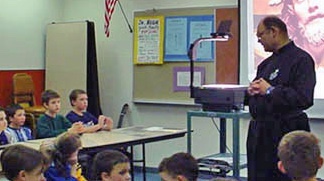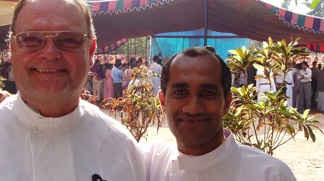[email protected]
Telephone: 773.266.1942
“When I was almost 15, I remember once noticing that many of my companions at school just didn’t look happy. Immediately inside of me a question arose: ‘Why not become a priest and help young people find happiness?’ This question, however, came as an interference – I had other plans for myself including a career, marriage and children. So I told myself: ‘Why you? Let others do that.’ But then I thought, ‘if all were to react in this way there would be no priests.’ So I opened my heart, accepted and immediately I was filled with an immense joy.”
Questions and Reflections
You describe a kind of euphoria in surrendering to your vocation. But then that passed?
Yes. But even when the initial euphoria had gone, I knew deep down that if I didn’t follow the journey I would be denying my very self. It was as if I had a new inner identity.”
Are the challenges in discerning a vocation different today than they were for you?
I think many of the challenges are similar. It’s hard for young people to give up the idea of getting married or pursuing a profession. For those who feel a call, the activity of life can be distracting, leading them to set aside the initial call until it may pop up again years later.
One of the big challenges to any vocation is the life commitment, along with the fear, “what if I make a mistake?” Often we think of a call as taking something away from us. But a call doesn’t eliminate your personality and unique qualities. In fact, they will color what you contribute to the community and your ministry.
In the case of celibacy, for example, it doesn’t mean that your paternal instincts don’t exist or are taken away. It just means they are expressed differently. I have not fathered a child in the traditional sense, of course, and yet if someone were to ask me if I had children, I would say yes, I have thousands! Celibacy doesn’t take away your humanity, it enhances it.
What has sustained you over the years?
My meditation on the Passion of Christ, especially God’s love for me personally, not just in general, as He loves all of us. That has been my greatest strength and has motivated me to try to bring that same awareness to others.
For me, the Passion of Jesus Christ is truly the most powerful instrument of God to conquer our hearts. On the one hand, it is the maximum expression of sin; there can be no greater sin than human beings condemning their own God to death. If that doesn’t shock us into seeing the evil power of sin, then what would? But the Passion is also the maximum expression of God’s love. So if that doesn’t fill up our hearts, what will? The Cross is God’s way of helping us renounce sin and allow ourselves to be captivated by His love and a desire to love and serve Him and others as He did for us.
Personally, the Passion also helps me to put my own suffering in its proper perspective. In the plan of redemption, our suffering is never wasted when we assume it; we actually share in our own Redemption (see Col. 1:23). Of course it’s not that we must look for suffering. One inevitably encounters it in life and the Passion helps us to deal with it in a positive and meaningful way. It’s the transmission of this message that I think is the best way to bring happiness to young people and others. When they realize how much God forgives and loves them, there can be no greater source of happiness.






